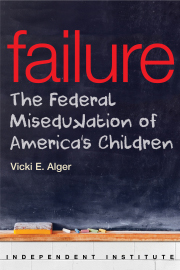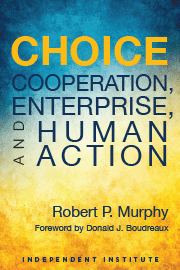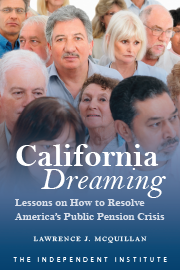K. Lloyd Billingsley • Tuesday, August 28, 2018 •
For decades, government employee unions had been confiscating money from non-members and using it for political causes the non-members oppose. The U.S. Supreme Court put a stop to that in the recent Janus decision. Now a federal district court judge has made firing federal employees a more difficult matter.
On August 26, a Saturday, U.S. District Judge Ketanji Brown Jackson blocked provisions of three recent executive orders she claims “undermine federal employees’ right to bargain collectively.” The executive orders were aimed at promoting more efficient government and making it easier to remove employees for poor performance or misconduct. At present, it takes between six months and a year, or much longer. As we noted, John Beale of the EPA claimed to work for the CIA, but he performed little if any work for nearly 20 years. His ruse went undiscovered and EPA bosses gave Beale retention bonuses and continued to pay his salary after he had retired.
Robert Higgs • Monday, August 27, 2018 •
When I use “participatory fascism”—for me a technical term in political economy, not an ideological or rhetorical cudgel—most people react to the “fascism” part and disregard the “participatory” part. Yet that part is critical to one’s understanding of how this system of rule proves so durable and resilient.
In the modern world, many people demand a voice in how they are ruled. In reality, however, every actual system of rule in a large society is and must be an oligarchy. Neither democracy in the simple sense nor autocracy in the sense of strict dictatorship or monarchy is workable. But oligarchy, a system in which a relatively small group of cooperating rulers (though it may have a nominal head ostensibly in charge) and their key financial supporters applies the nuts and bolts of rule is workable, indeed, indispensable. So, whether by design or by piecemeal pushing and pulling, this is the form that all modern governments take.
Craig Eyermann • Monday, August 27, 2018 •
In 2014, one of the biggest scandals in the history of the U.S. Department of Veterans Affairs erupted into the open when, thanks to a whistleblower at the Phoenix branch of the VA, the public learned for the first time of the secret wait lists for veterans seeking medical treatment, which VA supervisors and administrators around the country used to ration health care while making it appear that they were meeting performance targets, making them eligible to earn special bonuses.
Over four years later, the VA has struggled to fix the problem, where evidence of additional secret wait lists keeps coming up in news stories across the country.
One reason why the VA’s problems with excessive wait times for veterans seeking medical treatments have persisted was recently highlighted by the department’s Inspector General. Joe Davidson of the Washington Post reports on how policies set by the VA’s managers are tying up its medical staff to perform unnecessary exams.
Craig Eyermann • Thursday, August 23, 2018 •
With less than six weeks to go in its 2018 fiscal year, the U.S. government may be poised to go on one of the biggest fiscal year-end spending sprees in its history.
The Fiscal Times‘ Yuval Rosenberg reports on what is about to happen:
The end of the U.S. government’s fiscal year is less than two months away, and as Frank Konkel lays out at Nextgov, that means federal agencies will be on a mad dash to spend a big chunk of their budgets—qqqand some $140 billion more than they thought they’d get before Congress passed a $1.3 trillion spending deal earlier this year.
Here’s Konkel:
Without a budget agreement in place, agencies spent cautiously through the first two quarters of fiscal 2018 before the omnibus—signed six months late in March—obligated an additional $80 billion for defense and $63 billion for civilian agencies.
Federal agencies, now flush with cash, must obligate that money before the fiscal year ends on Sept. 30 or lose it to the Treasury Department. Analysts believe the federal market will see a monumental effort among procurement officials to spend as much on contracts as possible.
K. Lloyd Billingsley • Thursday, August 23, 2018 •
As we noted last year, the U.S. Supreme Court dismissed a California Public Employees’ Retirement System (CalPERS) lawsuit against investment banks, and the ruling saddled the massive pension system with losses of $300 million. This was hardly the only setback for CalPERS, the largest pension fund in the country, whose unfunded liabilities had increased 383 percent over ten years. In 2016, CalPERS was some $100 billion short of fully funding its pension obligations. With CalPERS cronies, Fred Buenrostro and Alfred Villalobos involved in a bribery scandal, corruption and mismanagement were sure to continue, but taxpayers find it hard to get the full story.
CalPERS does not disclose which retirees are receiving disability pensions and Transparent California is now seeking that data for research on disability fraud. As the Sacramento Bee observed, “work-related disability pensions are desirable because they allow public employees to retire early for medical reasons and to avoid paying income taxes.” CalPERS withheld the information on the grounds that they were protecting the retirees’ health information. CalPERS general counsel Matthew Jacobs told the Bee, “We have a long and successful history of exposing disability fraud wherever and whenever we uncover it,” but the attorney cited no actual cases the supposedly vigilant CalPERS had exposed.
As it happens, the Bee exposed the reality that nearly 70 percent of CHP officers retire on disability. For its part, the Los Angeles Times charted disability fraud in the Los Angeles police and fire departments, with supposedly disabled workers running marathons and such. Meanwhile, as long as CalPERS withholds the data on disability pensions, California taxpayers have good reason to believe this kind of fraud is much worse than anything revealed so far.
***
K. Lloyd Billingsley is a Policy Fellow at the Independent Institute and a columnist at The Daily Caller.
Raymond March • Wednesday, August 22, 2018 •
The Swedish phone app Natural Cycles recently made headlines for becoming the first app approved by the Food and Drug Administration for contraception. Natural Cycles uses morning temperature readings and its own algorithm to predict the user’s most fertile days (about ten days a month) during her ovulation cycle. The app has widespread popularity with nearly 700,000 users worldwide.
Although Natural Cycles is celebrated as being “first of its kind,” when we examine recent trends in medical technology, we find this story has been a long time coming.
The algorithm Natural Cycles uses to predict peak fertility days relies on an old contraceptive method commonly referred to as “charting your cycle.” The popular book Taking Charge of Your Fertility uses the same method to predict fertile days and was first published in 1995. The book has helped hundreds of thousands of women avoid becoming pregnant (or increase their chances of becoming pregnant) and has its own fertility charting app (OvaGraph).
Robert Higgs • Wednesday, August 22, 2018 •
Astute socialists (if that’s not an oxymoron) opt for participatory fascism, not outright socialism, in practice. They know that outright socialism—the nationalization and central control of all the major means of production—is a ruinous system. By opting for participatory fascism, they can get the bulk of what they seek, by means of pervasive regulation, heavy taxation, and floods of government spending, while allowing the fettered capitalists enough room for maneuver that they keep the economy from going straight to hell. Moreover, when anything goes wrong—and it will—they can blame the problem on capitalism, the fraudulently so-called free-market economy that remains in hobbled operation.
(For more on this idea, which I have been discussing for more than thirty years, see chapter 10 of my book Crisis and Leviathan or, in brief, this article.)
***
Robert Higgs is Senior Fellow in Political Economy at the Independent Institute, author or editor of over fourteen Independent books, and Editor at Large of Independent’s quarterly journal The Independent Review.
K. Lloyd Billingsley • Tuesday, August 21, 2018 •
That was airline captain Roger Murdoch, played by UCLA and NBA great Kareem Abdul-Jabbar in the 1980 film Airplane! full of unforgettable performances by Lloyd Bridges, Robert Stack and Barbara Billingsley (no relation). Nearly 40 years later, the public learns that a host of federal government bigshots, including the head of the Central Intelligence Agency, retain their top-secret security clearance even after they leave the job. Americans have good cause to find this troubling.
Alvaro Vargas Llosa • Tuesday, August 21, 2018 •
Turkey has everybody worried. An economic or financial crisis in a major emerging country can quickly destabilize other emerging regions and send shockwaves throughout the rest of the world.
The Turkish lira has collapsed since the beginning of the year (falling 45 percent so far) and its stock exchange, measured by its main index, has lost more than 10 percent of its value, dragging down many other stocks, particularly in Europe, with it. The perception is that the main culprit is the Trump administration’s decision to punish Turkey with a doubling of the tariffs on steel and aluminum. The reality is that this silly and counterproductive trade war, though it has the potential to make things worse, is not the main problem.
One reason behind the misperception is that Turkey’s GDP was growing very healthily until recently. Last year, Turkey’s economy outperformed India and China. But what was fueling this growth was an irresponsible amount of debt denominated in foreign currency. Much of the debt was borrowed from non-Turkish European banks, whose excessive exposure to Recep Tayyip Erdogan’s authoritarian country has the potential to rattle the financial system across the European Union.
Vicki Alger • Tuesday, August 21, 2018 •
It’s National Employee Freedom Week, and a majority of public-sector union members agree with a recent Supreme Court ruling banning the collection of fees without express consent, according to a just-released poll.
The case, Janus v. American Federation of State, County, and Municipal Employees, was brought against government unions for charging non-members “agency fees.” In a 5-4 decision, the court ruled unions must get permission before charging those fees.
Rather than ramp up recruitment efforts highlighting the benefits of membership, some union leaders have launched negative ad campaigns against organizations that inform union members of their opt-out rights.
A leading effort to do just that is National Employee Freedom Week, including the release of a new survey evaluating the opinions of public-sector union members. It found that 71 percent of respondents were aware of the Janus ruling, and 51 percent of them viewed the decision positively. Nearly one-third of respondents (32 percent) disagreed with the decision, while 17 percent were undecided.























